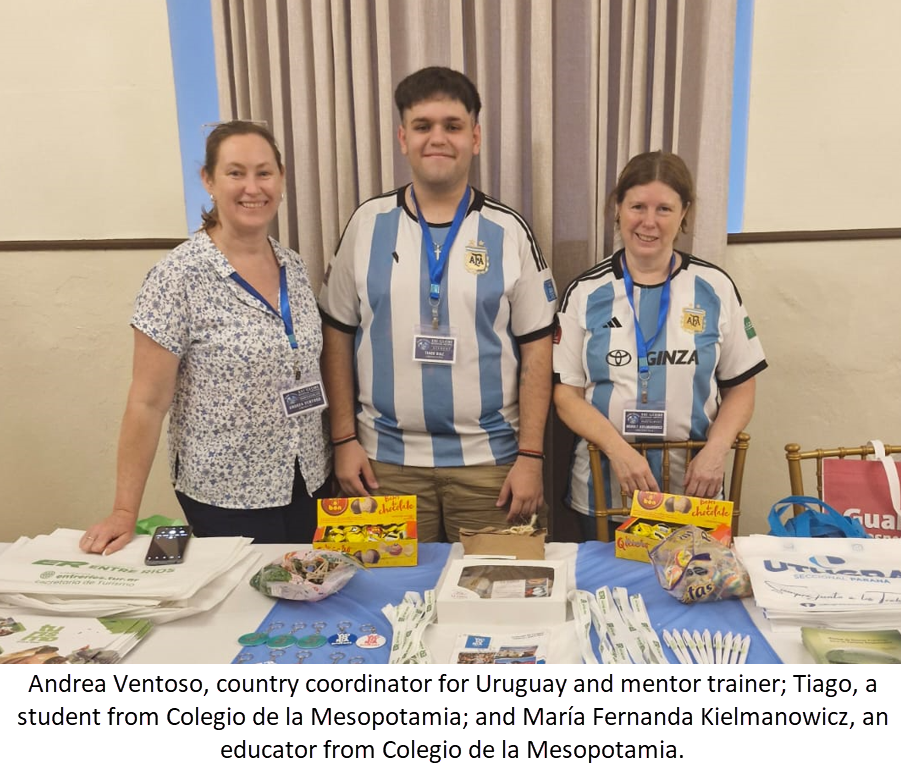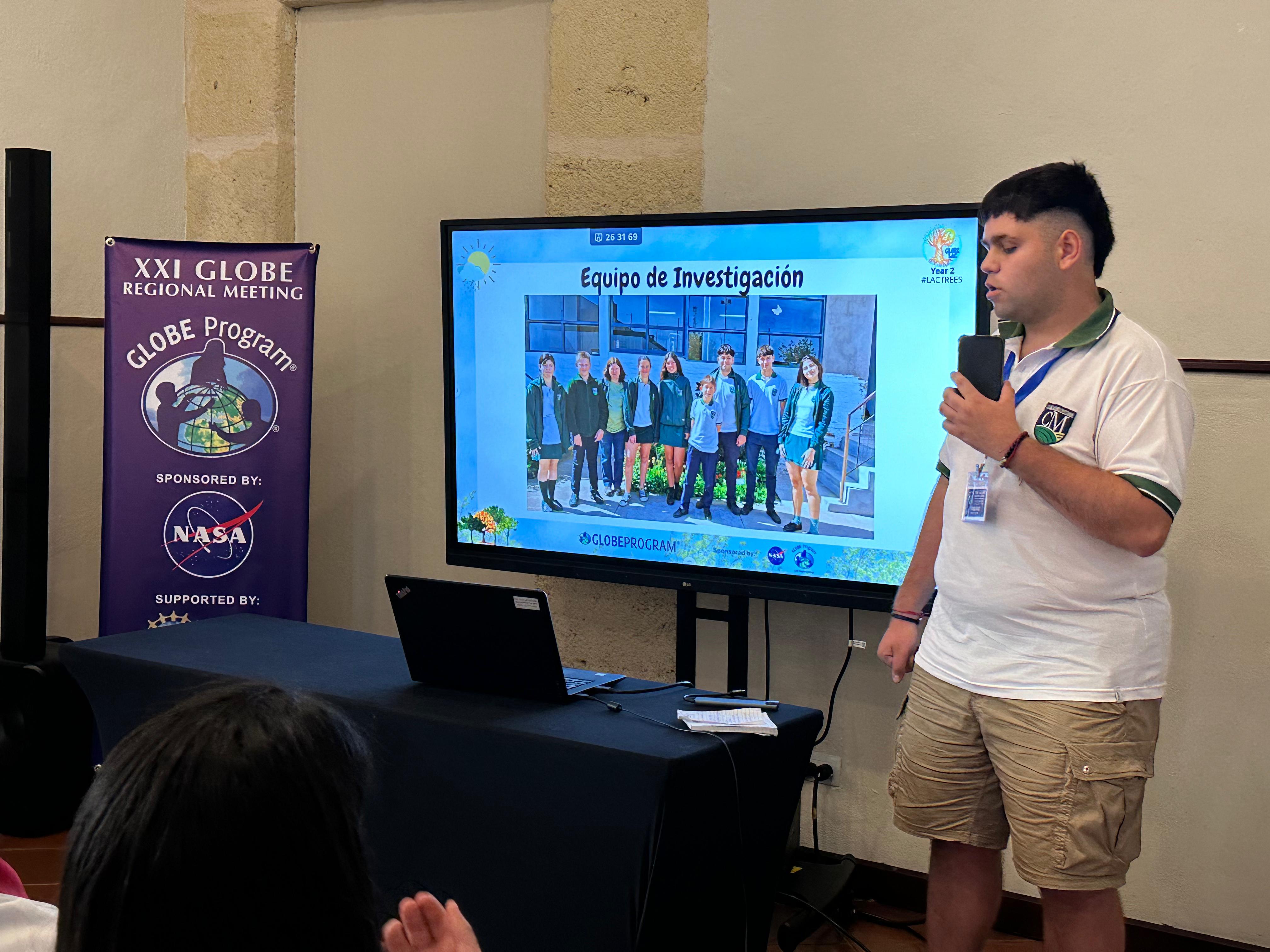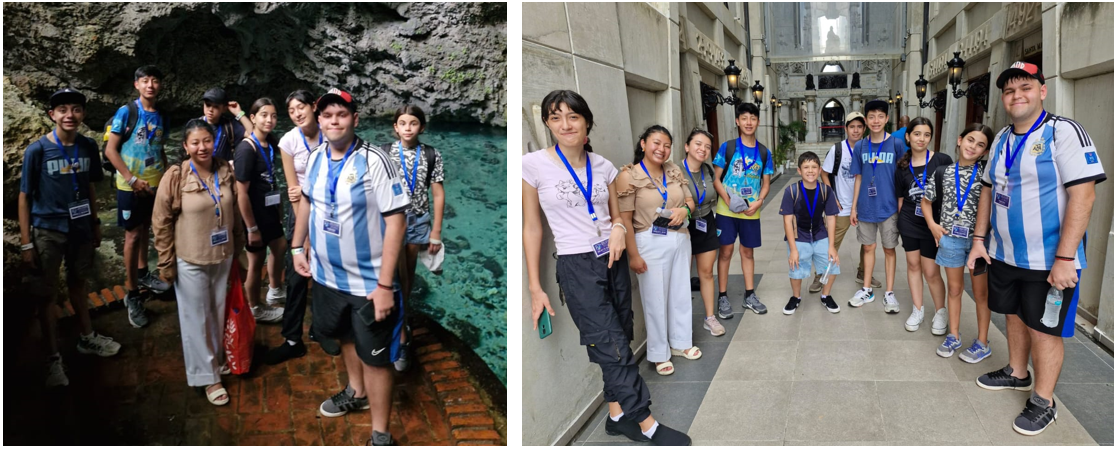Stars and STEM Stories
GLOBE Argentina: A Student Shines Through GLOBE Experiences
Professor María Fernanda Kielmanowicz, a GLOBE Argentina educator, shares her perspective on GLOBE’s impact on her and one of her students in this Stars Story.

Participating in this program and, above all, involving my students in the fascinating world of research, not only opens doors but also leaves a deep impact. Sharing those days with the GLOBE community is wonderful; however, if I had to highlight what I enjoyed the most, it would be the experience of selecting my student, Tiago Díaz Muñoz, as the representative of the research project after being awarded the stipend granted by the Regional Office to participate in the Regional Meeting in Santo Domingo, Dominican Republic. It was a privilege to see him in a different environment, where he confidently demonstrated his skills as a presenter and reinforced his self-assurance.
To understand the impact GLOBE had on Tiago’s family, I went straight to the source and asked his parents.
What did Tiago’s participation in the GLOBE Latin America Regional Meeting mean to you as parents? Do you consider this type of incentive important for students?
Tiago's Parents: For us, as Tiago’s parents, his participation in the GLOBE Latin America [and Caribbean] (LAC)Regional Meeting in Santo Domingo, Dominican Republic, was an incredible and wonderful experience.
From the very beginning, when he was invited and chosen by his biology teacher as the student responsible for presenting the project, we felt immense joy and pride. He wasn’t just representing a group of students and a scientific project, but also the Colegio de la Mesopotamia, our city of Victoria, and … our country, Argentina.
Additionally, seeing our son’s determination, and especially his excitement, to embrace this opportunity, was truly moving. It opened a significant door for him into the world of scientific research. The fact that he could represent his classmates and the school, with the guidance of his teacher, was remarkable. Together, they worked, investigated, and collaborated for a common goal, and this was clearly reflected in the presentation and Tiago’s words.

When his participation was confirmed, we sprang into action to help as parents. Paperwork, … passports, flights, and securing funds became part of our daily routine as we worked to make the trip a reality.
We consider projects like these incredibly important and a huge incentive for students because they bring ideas or problems to life in a scientific project. Teamwork and collective effort are evident, along with the satisfaction this brings. It’s also an opportunity to develop an integrated project with possibilities for competition, continued learning, and practical application. These initiatives are invaluable for encouraging students to invest in their education and pursue research. If you have the opportunity—and many kids don’t—don’t let it slip away! Keep going; education is a lifelong journey.
Finally, as parents, we have so much to be thankful for—not only to GLOBE LAC but also to our beloved Colegio de la Mesopotamia, which witnessed our son’s growth. As he prepares to graduate next year, this milestone feels doubly rewarding. Our gratitude extends to everyone who contributed to his education, but especially to his teacher, Fernanda Kielmanowicz, for choosing him from the very beginning for this adventure, for being his travel companion, and for mentoring him in scientific development. Eternal thanks.
Professor Kielmanowicz: I couldn’t resist asking Tiago:
What did this opportunity mean to you?
Tiago: Traveling to Santo Domingo to present the project ‘A High-Flying Problem’ was an incredible experience. It meant so much to me because it was the chance to take something I had worked on for so long with my teacher and classmates to a larger stage, meet new people, and see how our work could bear fruit.
It also gave me the opportunity to prove to myself that with effort and dedication, I can reach goals that once seemed out of reach. It was a feeling of pride and also of growth, as I received valuable feedback that helped me grow as a person and a student.
Professor Kielmanowicz: And since GLOBE always invites us to do more, I asked Tiago:
Would you participate in a similar experience again?
Tiago: Definitely! I would do it again without hesitation—not just for the chance to learn more but also for the adrenaline and excitement of presenting in front of an audience, defending something born from teamwork. Every time I face a challenge like this, I realize how much I can learn from others, how my ideas can improve, and how important it is to step out of my comfort zone. It’s not easy, but it’s incredibly enriching.
Professor Kielmanowicz: Finally, I asked:
What would you say to other students about your experience?
Tiago: I’d tell them to go for it and seize every opportunity to present their ideas or projects. Sometimes we think we’re not ready or that we can’t compete, but that’s a limitation we overcome with work, knowledge, and growth. When you take on challenges like this, you don’t just learn about the project or the related topics; you learn about yourself.
You take on a commitment that requires effort and patience, but it
pays off. It’s a way to broaden your mind, discover new cultures, and
see different perspectives. From everyone I met, I learned
something—especially from [my teacher], her passion and dedication. If
you have the chance to do something like this, don’t let it pass you
by! You’ll gain more than you ever imagined."
This
experience demonstrates that research is not just for a select few: we
can all participate, learn, and leave a mark. If you’re curious about
science, caring for the environment, or helping your community, don’t
hesitate to seek out opportunities like those GLOBE offers. Take that
first step, work as a team, and discover what you’re capable of.
Science isn’t just in laboratories; it’s everywhere there are
questions waiting to be answered!

Images courtesy of the Latin America and Caribbean Regional Coordination Office.





